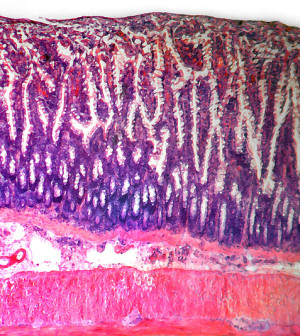- 10 Strategies to Overcome Insomnia
- Could Artificial Sweeteners Be Aging the Brain Faster?
- Techniques for Soothing Your Nervous System
- Does the Water in Your House Smell Funny? Here’s Why
- Can a Daily Dose of Apple Cider Vinegar Actually Aid Weight Loss?
- 6 Health Beverages That Can Actually Spike Your Blood Sugar
- Treatment Options for Social Anxiety Disorder
- Understanding the Connection Between Anxiety and Depression
- How Daily Prunes Can Influence Cholesterol and Inflammation
- When to Take B12 for Better Absorption and Energy
Frequent Heartburn May Signal More Serious Digestive Problem

Every Thanksgiving, lots of people loosen their belts and reach for antacids to quell an overstuffed tummy.
But for some, turkey day is just another day of severe or persistent heartburn, and that chronic digestive trouble may be a sign of a condition called gastroesophageal reflux disease (GERD), an expert says.
In GERD, the contents of the stomach repeatedly flow back into the esophagus. This causes symptoms such as chronic heartburn, regurgitation, difficulty swallowing, sore throat and morning hoarseness, explained Nancy Norton, president and founder of the International Foundation for Functional Gastrointestinal Disorders.
“The symptoms of GERD can seem so common that many people do not consult with health care providers or mention them during routine exams,” Norton said in a foundation news release.
“When symptoms often occur two or more times a week, or become more severe, it is important to talk to a physician. Left untreated, GERD can lead to complications, or other health problems,” she added.
If you think you may have GERD, see your doctor, Norton advised.
Before your appointment, she said, makes notes about: when your heartburn occurs, how often, and its severity; any other symptoms; how your symptoms affect your daily activities and sleep; diet and lifestyle changes you’ve made in an attempt to relieve your symptoms and how effective those changes were; and any antacids or other over-the-counter medications you’ve used and how effective they were.
“Providing symptom-related details can help a physician identify key elements that characterize GERD,” Norton said.
She said getting an accurate diagnosis is the first step in creating a personalized treatment plan. And, treatment can help improve symptoms, make you feel better and help you avoid future complications, she explained.
Nov. 22 to 28 is GERD Awareness Week.
More information
The U.S. National Institute of Diabetes and Digestive and Kidney Diseases outlines GERD treatment options.
Source: HealthDay
Copyright © 2026 HealthDay. All rights reserved.










